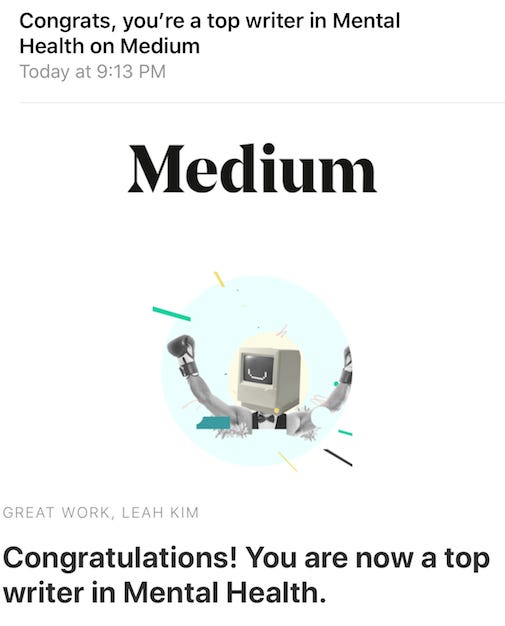When We Fall Off Our Creative Wagons — Part 2

When I first started posting on Medium back in October, I went in with a lot of gusto. Within just one week, I received notification that I was a Top Writer in Mental Health. I cried. After over four years of feeling not-myself, I felt like I was finally on track.

And then — I kind of froze. I had put so much of myself and my private, personal, and painful experience out there and it felt like it was too much.
December came around and I hadn’t really posted anything. I hadn’t really written anything, not even in my personal journal. This not-writing snowballed, especially with the holidays which were a massive distraction.
One day around New Year’s, I came to my Medium page and saw that I had lost Top Writer status. I was crushed.
The self-criticism and shaming started big time: Who do you think you are? Why did you think you could start doing something new out of nowhere? You think you’re going to publish a book someday? Stop being ridiculous. Just go back to what you were doing before.
I was stuck in this mindset for a couple weeks. And then I heard something that snapped me out of it: All artists retreat from time to time. All artists experience feeling too exposed and go into hiding.
And just like that, I reframed my quiet few weeks as an artist’s retreat instead of a poser’s failure.
Writers — we write simply to write. We write because we can’t not write. We write because it soothes, expresses, and frees our Souls. If someone else reads our writing? Well, that’s just the cherry on top.
It is always helpful to have tools to keep us on track. I follow screenwriter Don Roos’ Kitchen Timer method (and I’m going to be honest — I first learned about it in Lauren Graham’s autobiography, which I read after binge-watching Gilmore Girls on Netflix). I sent it to my illustrator friend (that I mentioned in Part 1 of this post) immediately after our breakfast together that morning as it applies to all creative work. In case you haven’t heard of it, here are the details below:
Don Roos’ Kitchen Timer
Every writer deserves a doable way of being and feeling successful every day. We learn to judge ourselves on behavior, rather than content.
1. Get a kitchen timer.
2. Decide on Monday how many hours we will do on Tuesday. When in doubt, or under pressure or self-attack, we choose fewer hours rather than more. Start with 1 hour, 30 minutes, or 20 minutes. Mark it in your calendar like you would any other appointment.
3. No phones. No texts. No music with words. No internet. No reading. No pencil sharpening, desk tidying, or organizing.
4. Open two documents: Our Journal and the Project we’re working on.
5. An hour consists of time spent keeping our writing appointment. We don’t have to write at all. The entire hour can be spent writing in our Journal. Anything written in the Journal is fine — complaints, ideas, what we ate for dinner, “I hate writing.” When we wish, we write on the Project document and write for as long as we like. When we get tired, we pop back to the Journal. When disgust or fatigue arise, we don’t take a break by getting up from the desk. We take a break by returning to the comforting arms of our Journal, until that bores us. Then we’re ready to work on our Project again. We use our boredom in this way. It is always ok to spend the entire time writing in our Journal.
6. It is infinitely better to write fewer hours every day than many hours on one day and none the next. If we have a crowded weekend, we choose a half or quarter hour as our time. We are always trying to minimize our resistance. Beginning on Monday after two days off is a challenge.
7. When the hour is up, we stop. Even if we’re in the middle of a sentence. If we’ve scheduled another hour, we take a break — read, eat, run errands. We are not trying to create a cocoon we must stay in.
8. If we don’t meet our hours, it means we’ve scheduled too many. We schedule less the next day. We don’t try to catch up or make up. We let the past go and move on.
9. We credit ourselves for fulfilling our commitment. The rest of the day is ours.
10. A word about content: This is not about creating perfect content all the time. This is about the knowledge that we have satisfied our commitment to ourselves, the freedom from anxiety and resistance, the stilling of the hectoring voice inside us that used to yell at us that we weren’t writing enough. All this opens us up creatively.
Sending love from the artist in me to the artist in you.
In case you missed Part 1 of this post:
When We Fall Off Our Creative Wagons — Part 1Abandoning Social Media and other thoughts on freeing our inner artist

